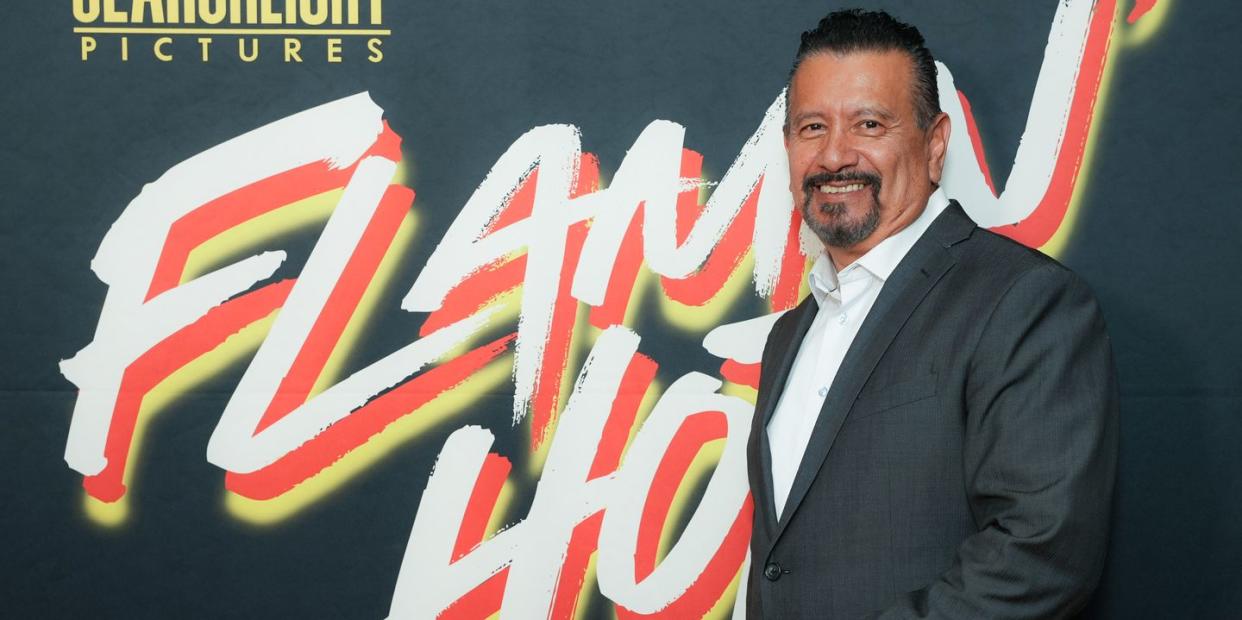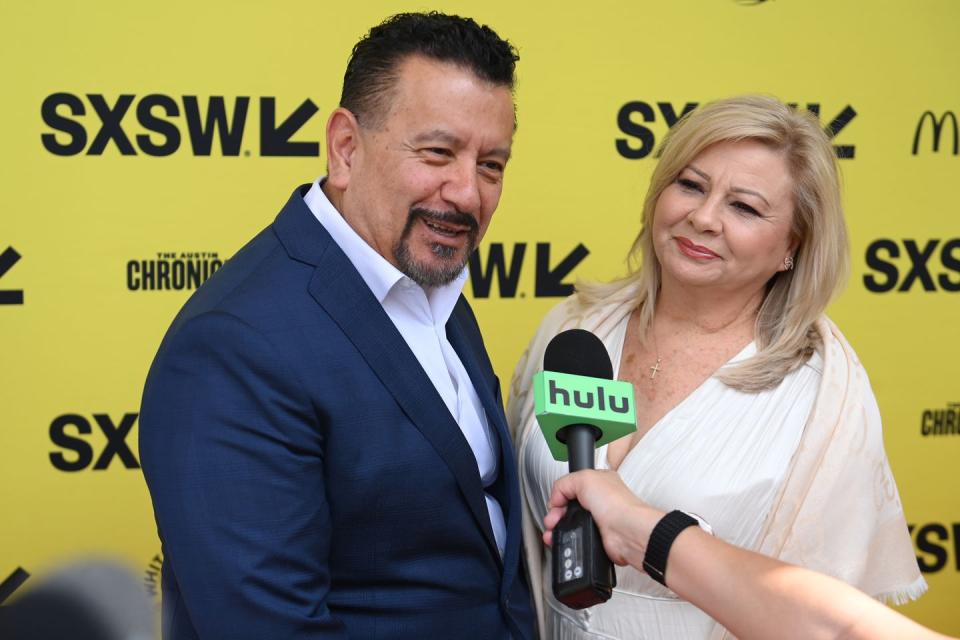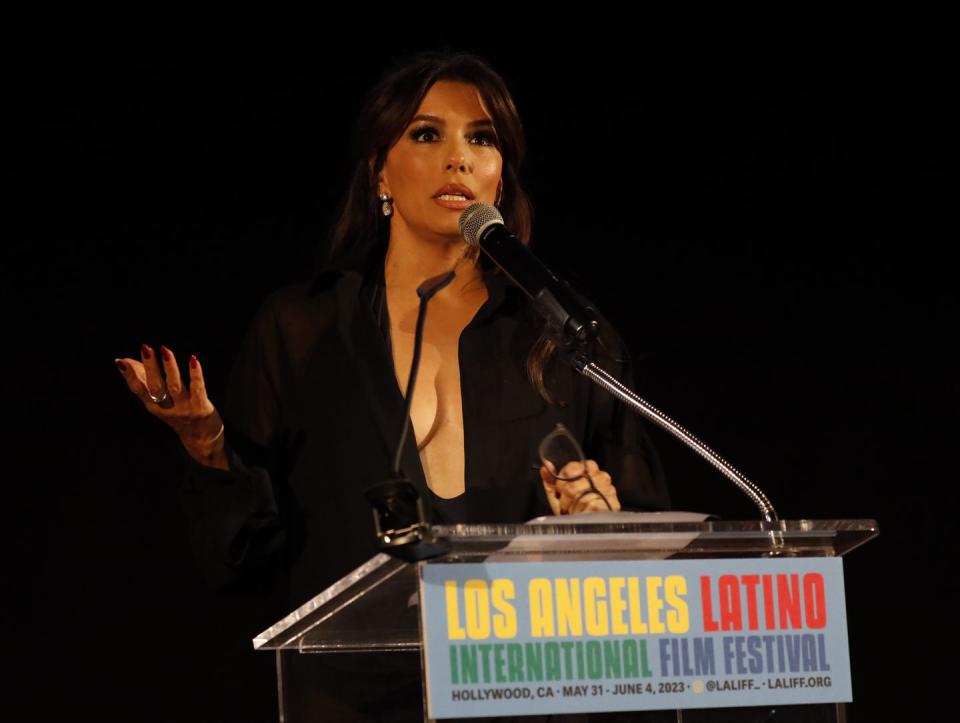The True, Disputed Story Behind “Flamin’ Hot”

- Oops!Something went wrong.Please try again later.
"Hearst Magazines and Yahoo may earn commission or revenue on some items through these links."
The story of Richard Montañez’s life sounds custom-made for Hollywood: a rags-to-riches tale of a poverty-stricken janitor who became a top marketing executive at Frito-Lay after inventing Flamin’ Hot Cheetos in his own home.
Eva Longoria, who has called Montañez the “godfather of Hispanic marketing,” tells this story with her directorial debut with Flamin’ Hot, a film based upon Montañez’s 2013 memoir A Boy, A Burrito, and a Cookie: From Janitor to Executive. It’s now streaming on Hulu and Disney+.
But not everyone agrees with Montañez’s claims. Frito-Lay launched a company-wide investigation that found no proof Montañez invented the Flamin’ Hot brand. Others have accused him of lying about his involvement for personal gain, which Montañez adamantly denies.
So what is the true story behind this flaming hot controversy?
A PhD in ”Poor, Hungry, and Determined"

The son of a Mexican immigrant, Montañez grew up in a migrant labor camp in Southern California with 10 siblings living in a one-bedroom apartment. He got into gang trouble in his youth, according to his memoir, and credits those early challenges with helping shape his character.
“I have a PhD: I’ve been being poor, hungry, and determined,” he told The Washington Post. “I think when you’ve experienced those three things, there’s a lot of wisdom. Because when you’ve been poor, there’s so much innovation that comes out of that.”
After getting a janitorial job at the Frito-Lay plant in Southern California, Montañez said a Cheeto machine broke down, resulting in a batch that wasn’t dusted with flavoring. He claims to have brought the batch home and seasoned them with chili powder, creating a snack inspired by street vendors in his neighborhood who made Mexican grilled corn with lime and chili.
Montañez then claims to have pitched the product to the Frito-Lay CEO through the company’s “method-improvement program,” which sought new ideas from employees. In his memoir, Montañez describes donning a $3 tie and pitching his idea during a 1991 meeting with more than 100 people, including the CEO and several company executives.
Flamin’ Hot Cheetos became a billion-dollar brand, and Montañez rose from janitor to marketing executive at Frito-Lay, from which he retired in 2019. He began publicly claiming credit for having invented the brand in the late 2000s, selling his story and participating in speaking engagements for fees of up to $50,000 per appearance.
A Dispute to Montañez’s Story
At the prompting of Lynne Greenfeld, Montañez’s public claims triggered a company-wide investigation of his claims in 2018. Also a Frito-Lay employee, Greenfeld received the assignment to develop the Flamin’ Hot Cheetos brand in 1989, and the company previously credited her for naming and helping bring the product to market.
“It is disappointing that 20 years later, someone who played no role in this project would begin to claim our experience as his own and then personally profit from it,” Greenfeld told the Los Angeles Times.
Frito-Lay interviewed dozens of employees and reviewed company records as part of its investigation, According to an investigative story released by the Times in May 2021, the company concluded that “none of our records show that Richard was involved in any capacity in the Flamin’ Hot test market.”
According to the Los Angeles Times, Flamin’ Hots were created by a team of snack food professionals based in the company’s corporate headquarters in Texas, rather than the California plant where Montañez worked. Frito-Lay officials said they could find no proof that the pitch meeting described in Montañez’s memoir ever happened.
The article also disputed Montañez’s claim that he was partially inspired to pitch his product by a motivational video featuring Frito-Lay CEO Roger Enrico. The newspaper noted that Enrico didn’t join the company until early 1991, nearly six months after the Flamin’ Hot products were already invented.
“We value Richard’s many contributions to our company, especially his insights into Hispanic consumers, but we do not credit the creation of Flamin’ Hot Cheetos or any Flamin’ Hot products to him,” Frito-Lay said in a statement. The company has also said it “can’t draw a clear link” to a specific creator because the brand’s development was a team effort.
Montañez Responds
In response to the Los Angeles Times story, Montañez has said he never knew Greenfeld, nor was he aware of what other divisions in the company were doing. Montañez claimed that as a janitor outside of the executive team, there was little documentation about his role in developing the brand, which is why the company’s investigation couldn’t find definitive proof.
“I don’t care what room you’re in, there’s always somebody in the room that’s going to try to steal your destiny,” Montañez said in a video after the story’s release. “They may even say you never existed. I want you to do this: Write down your history, because if you don’t, somebody else will. Remember that.”
Frito-Lay officials said the Times story created confusion over Montañez’s role with the company and put “a strain on our valued friendship with Richard Montañez and the Latino community.” Ex-CEO Al Carey said while Montañez didn’t necessarily invent Flamin’ Hot Cheetos, his charismatic personality and support for the product aided its success.
“Richard is an important part of PepsiCo’s history and the success of the company,” Frito-Lay parent company PepsiCo said in a statement. “He is an inspiration and his story cannot be belittled. [We] want Richard to know he is valued and cared for among PepsiCo’s employees, and we only wish him happiness and success.”
Eva Longoria: A Film about Montañez

The conflicting statements about Montañez’s involvement with the snack hasn’t deterred the filmmakers behind Flamin’ Hot. The creators of the film were informed about the conflict in 2019 but proceeded with production anyway, according to the Los Angeles Times.
Longoria has said the film isn’t about the history of the snack brand itself, which she said would “not be a very interesting movie.” Instead, she called it a story about Montañez, “who happened to have a hand in creating the number one snack in the world.”
Although the company still officially disputes Montañez’s claims, Frito-Lay hasn’t voiced opposition to the making of the film, describing it as “Richard Montañez’s story, told from his point of view.”
“His contributions to Frito-Lay are highlighted throughout the film, specifically his insights and ideas on how to better serve Hispanic consumers and engage the Hispanic community, a legacy PepsiCo continues today,” the company stated. “We are grateful to him for that and hope people enjoy the film.”
Watch Flamin’ Hot on Hulu and Disney+
Flamin’ Hot, directed by Eva Longoria, is now streaming on Hulu and Disney+. The film stars Jesse Garcia, Annie Gonzalez, Dennis Haysbert, and Tony Shalhoub.
You Might Also Like

